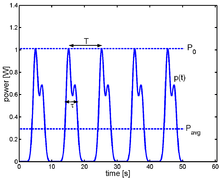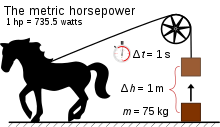Power (physics)
In physics, power is the amount of energy transferred or converted per unit time. In the International System of Units, the unit of power is the watt, equal to one joule per second. In older works, power is sometimes called activity.[1][2][3] Power is a scalar quantity.
| Power | |
|---|---|
Common symbols | P |
| SI unit | watt (W) |
| In SI base units | kg⋅m2⋅s−3 |
Derivations from other quantities | |
| Dimension | |
| Part of a series on |
| Classical mechanics |
|---|
Second law of motion |
|
Core topics |
|
Categories ► Classical mechanics |
The output power of a motor is the product of the torque that the motor generates and the angular velocity of its output shaft. The power involved in moving a ground vehicle is the product of the traction force on the wheels and the velocity of the vehicle. The power of a jet-propelled vehicle is the product of the engine thrust and the velocity of the vehicle. The rate at which a light bulb converts electrical energy into light and heat is measured in watts—the electrical energy used per unit time.[4][5]
Definition
Power is the rate with respect to time at which work is done; it is the time derivative of work:
where P is power, W is work, and t is time.
If a constant force F is applied throughout a distance x, the work done is defined as . In this case, power can be written as:
If instead the force is variable over a three-dimensional curve C, then the work is expressed in terms of the line integral:
From the fundamental theorem of calculus, we know that . Hence the formula is valid for any general situation.
Units
The dimension of power is energy divided by time. In the International System of Units (SI), the unit of power is the watt (W), which is equal to one joule per second. Other common and traditional measures are horsepower (hp), comparing to the power of a horse; one mechanical horsepower equals about 745.7 watts. Other units of power include ergs per second (erg/s), foot-pounds per minute, dBm, a logarithmic measure relative to a reference of 1 milliwatt, calories per hour, BTU per hour (BTU/h), and tons of refrigeration.
Average power
As a simple example, burning one kilogram of coal releases much more energy than does detonating a kilogram of TNT,[6] but because the TNT reaction releases energy much more quickly, it delivers far more power than the coal. If ΔW is the amount of work performed during a period of time of duration Δt, the average power Pavg over that period is given by the formula:
It is the average amount of work done or energy converted per unit of time. The average power is often simply called "power" when the context makes it clear.
The instantaneous power is then the limiting value of the average power as the time interval Δt approaches zero.
In the case of constant power P, the amount of work performed during a period of duration t is given by:
In the context of energy conversion, it is more customary to use the symbol E rather than W.
Mechanical power
Power in mechanical systems is the combination of forces and movement. In particular, power is the product of a force on an object and the object's velocity, or the product of a torque on a shaft and the shaft's angular velocity.
Mechanical power is also described as the time derivative of work. In mechanics, the work done by a force F on an object that travels along a curve C is given by the line integral:
where x defines the path C and v is the velocity along this path.
If the force F is derivable from a potential (conservative), then applying the gradient theorem (and remembering that force is the negative of the gradient of the potential energy) yields:
where A and B are the beginning and end of the path along which the work was done.
The power at any point along the curve C is the time derivative:
In one dimension, this can be simplified to:
In rotational systems, power is the product of the torque τ and angular velocity ω,
where ω measured in radians per second. The represents scalar product.
In fluid power systems such as hydraulic actuators, power is given by
where p is pressure in pascals, or N/m2 and Q is volumetric flow rate in m3/s in SI units.
Mechanical advantage
If a mechanical system has no losses, then the input power must equal the output power. This provides a simple formula for the mechanical advantage of the system.
Let the input power to a device be a force FA acting on a point that moves with velocity vA and the output power be a force FB acts on a point that moves with velocity vB. If there are no losses in the system, then
and the mechanical advantage of the system (output force per input force) is given by
The similar relationship is obtained for rotating systems, where TA and ωA are the torque and angular velocity of the input and TB and ωB are the torque and angular velocity of the output. If there are no losses in the system, then
which yields the mechanical advantage
These relations are important because they define the maximum performance of a device in terms of velocity ratios determined by its physical dimensions. See for example gear ratios.
Electrical power

The instantaneous electrical power P delivered to a component is given by
where
- is the instantaneous power, measured in watts (joules per second)
- is the potential difference (or voltage drop) across the component, measured in volts
- is the current through it, measured in amperes
If the component is a resistor with time-invariant voltage to current ratio, then:
where
is the resistance, measured in ohms.
Peak power and duty cycle

In the case of a periodic signal of period , like a train of identical pulses, the instantaneous power is also a periodic function of period . The peak power is simply defined by:
The peak power is not always readily measurable, however, and the measurement of the average power is more commonly performed by an instrument. If one defines the energy per pulse as:
then the average power is:
One may define the pulse length such that so that the ratios
are equal. These ratios are called the duty cycle of the pulse train.
Radiant power
Power is related to intensity at a radius ; the power emitted by a source can be written as:
See also
- Simple machines
- Orders of magnitude (power)
- Pulsed power
- Intensity — in the radiative sense, power per area
- Power gain — for linear, two-port networks
- Power density
- Signal strength
- Sound power
References
| Wikimedia Commons has media related to Power (physics). |
| Wikiquote has quotations related to: Power (physics) |
- Fowle, Frederick E., ed. (1921). Smithsonian Physical Tables (7th revised ed.). Washington, D.C.: Smithsonian Institution. OCLC 1142734534. Archived from the original on 23 April 2020.
Power or Activity is the time rate of doing work, or if W represents work and P power, P = dw/dt. (p. xxviii) … ACTIVITY. Power or rate of doing work; unit, the watt. (p. 435)
- Heron, C. A. (1906). "Electrical Calculations for Rallway Motors". Purdue Eng. Rev. (2): 77–93. Archived from the original on 23 April 2020. Retrieved 23 April 2020.
The activity of a motor is the work done per second, … Where the joule is employed as the unit of work, the international unit of activity is the joule-per-second, or, as it is commonly called, the watt. (p. 78)
- "Societies and Academies". Nature. 66 (1700): 118–120. 1902. doi:10.1038/066118b0. Retrieved 23 April 2020.
If the watt is assumed as unit of activity…
- Halliday and Resnick (1974). "6. Power". Fundamentals of Physics.CS1 maint: uses authors parameter (link)
- Chapter 13, § 3, pp 13-2,3 The Feynman Lectures on Physics Volume I, 1963
- Burning coal produces around 15-30 megajoules per kilogram, while detonating TNT produces about 4.7 megajoules per kilogram. For the coal value, see Fisher, Juliya (2003). "Energy Density of Coal". The Physics Factbook. Retrieved 30 May 2011. For the TNT value, see the article TNT equivalent. Neither value includes the weight of oxygen from the air used during combustion.
